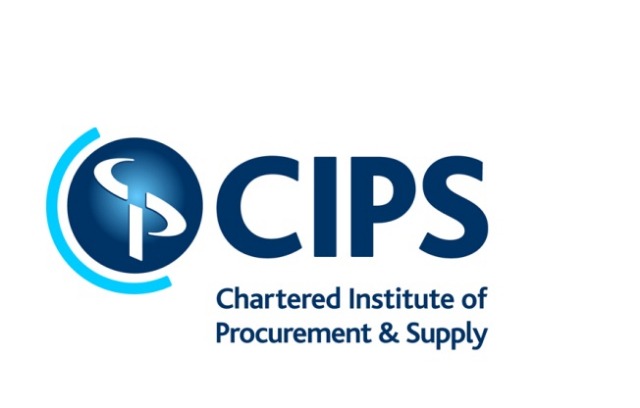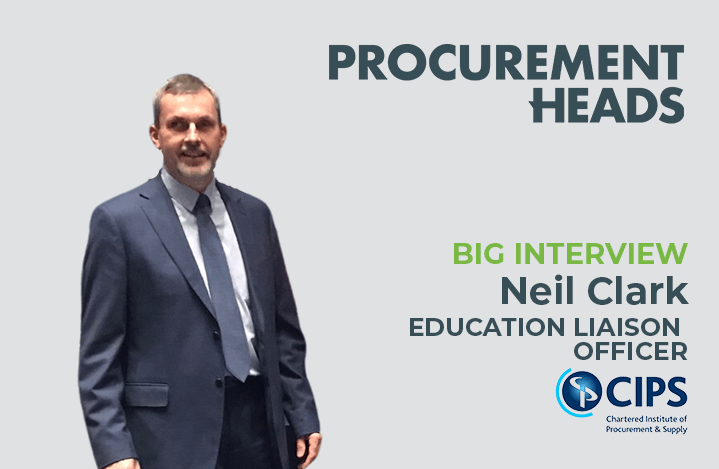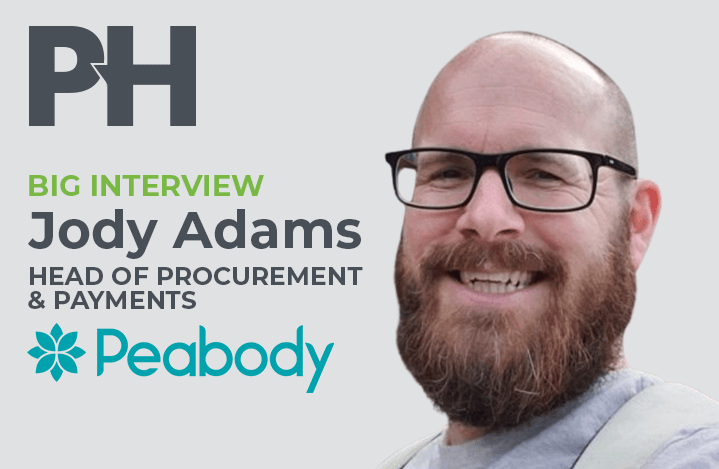For this month’s Big Interview, Procurement Heads caught up with Neil to hear about his career and the role of CIPS’ South of England branch.
How did you become involved with the South of England CIPS branch?
I responded to a LinkedIn post requesting Purchasing Professionals to support a business game in a school in the region. Around the same time, I attended a Get Inspired careers fair in Portsmouth with my teenage son.
I thought the event was a great showcase for a whole range of careers and provided invaluable insight to students.
I was encouraged by CIPS linking the two experiences together and contacted the local branch to see if I could offer some energy to what they were doing.
I was already qualified with CIPS, but I was probably classed as a dormant member.
After seeing all the great things being done at this careers fair, I was inspired and felt it was the right time to get involved again and give something back!
So that led you to get in touch with the CIPS committee then?
Yes, I met with the local branch and they asked me to take responsibility for liaison with education, which was a new post at the time.
That was back in May 2016. It was pretty much a blank canvas so I began with getting in contact with the people who ran the careers fair my son attended, EBP South, and they encouraged me to look at the events they were running, get involved with the events and take the message there.
I was asked to put a programme of events together and from there we have grown.
In 2019 we supported four major careers fairs and reached out to a potential 1,800 students.
As a result, we’ve had some amazing and unexpected conversations with students, and I’m amazed in terms of what they already know but don’t think they know. It’s an incredible experience to see these “light bulb” moment; so inspirational. Having conversations with a 14-year-old around sustainability; they know so much!
How old are the children?
They are at School and College, youngest is 12 and then up to 18 but generally, they are around the age where they are choosing their options or taking exams, choosing colleges and making big decisions in their lives.
Do you do this by yourself?
I’m supported by a small but dedicated bunch of volunteers at the branch.
Our aim is to reach out to students, signpost the profession and provide insight and conversation, and to potentially influence and inspire the next generation of Procurement professionals.
Many of the students we speak to don’t realise they can have a career in Procurement so we use games, exercises and structured conversations to help them see what our role is and show them that most companies rely upon Procurement and that Procurement is a growing, important function to the success of many organisations.
What does your typical day look like and what are your specific responsibilities at branch level?
At branch level, we’re all volunteers and all have day jobs.
Typically, we complete our required activity outside of normal working hours, a couple of us are interim managers and plan free days to support the programme.
For the South of England branch there are about 10-12 of us and we each commit to arranging one branch event a year.
This involves finding a venue and speaker and a subject that we think might excite the members.
We have to draft out the event template and get approval from Easton House to run the event; generally, they’re checking we don’t cross over any lines with CIPS’ business partners.
Can anyone in Procurement attend the events?
The events are for both members and non-members, and we also have people from other branches join us.
It’s not territorial, we’re trying to be all-inclusive.
Our area is huge, we go all the way from Poole to Chichester and up to Basingstoke, and we’re conscious as a branch about how best to cover it.
We try to run different events across the region so everyone can come along.
I have specific responsibility for the education liaison, building on the relationships we have and responding to specific questions from schools and colleges. We’re trying year-on-year to reach out to different organisations so we’re not just doing the same things.
As volunteers, one of the challenges we have is receiving more requests for support at events than we can actually support.
Why do we do it?
If we can engage and inspire with just one person and see the lightbulb come on, it feels great.
What are the biggest challenges the South of England branch face?
One of the biggest challenges is establishing and maintaining contact with branch members and running events that are of interest to them.
We have more than 1,200 members and we’re finding that it’s the venue that generally attracts attendance and also the time of the week we run the event.
We switched the events from Thursday to earlier in the week and have seen attendances increase.
Where are some of these events held?
Last summer, the National Air Traffic Services at Whiteley opened up their facility to provide insight into what is a pretty unique environment, and they allowed us into the training facility.
You wouldn’t normally get access to that and we had at least 40 people attend the event.
We also held an event at the Historic Wardroom at HMS Nelson, which was organised by BAE Systems. This provided an amazing historical backdrop to presentations about cutting edge technological developments in demand planning, as well as a real-life account about the supply chain for the HMS Queen Elizabeth Aircraft Carrier.
How do CIPS members get involved at branch level?
In the first instance by contacting the branch via email, southofengland@cipsbranch.org, or through our LinkedIn site CIPS South of England or by attending a branch event and talking with one of the committee.
We are always keen to involve volunteers to support our work and join the committee.
It really depends on the time and effort that members are able to contribute, it’s not predetermined and what we want to do is harness the energy of people thinking about getting involved with the branch.
We always need venues and speakers and encourage members to consider hosting an event at their place of work and showcase their journeys, challenges and achievements.
What advice would you give someone considering membership and what are the benefits?
The CIPS qualification is a recognised Professional qualification.
It is a structured course that can be completed at the individual’s own pace, which is something other courses don’t necessarily give.
There’s a combination of self-study; distance learning, block study at an approved study centre or at College of Further Education.
In our region, Havant and South Downs College, near Portsmouth, supports CIPS qualifications.
Study is supported by experience and opportunity in your workplace, as well as, networking within the profession.
Attending branch events gives the opportunity to network and provides access to contacts that might not otherwise be available.
Data shows that Procurement professionals who have the MCIPS qualification, across the board in all roles, earn up to 15% more than their colleagues without the qualification and many Procurement and Supply Chain opportunities list MCIPS qualification as preferred.
Because it is structured and recognised as a professional qualification, it ticks some of the boxes with employers, they know you’ve got the training in the various modules – it sets a level which they don’t have to probe on the selection process.
It makes it easier for selection.
When did you achieve your MCIPs and what are the benefits of having this qualification?
I qualified in 1984 and the route I took was slightly different than that of today.
I studied ONC and HNC Mechanical and Production Engineering.
Once I completed this I was worked in a supply chain environment and was given the opportunity to study HNC Business and Finance and then undertook a further two years of study at night school to complete the CIPS qualification with the obligatory dissertation.
It wasn’t as business structured then as it is today, but it still had the recognition of being a professional qualification.
I know that it has opened doors for me in my career and provided the perfect platform from which to develop the toolkit required to meet the many challenges of the business environment.
How can we get Procurement on the map?
This is interesting and it is well documented that the profession doesn’t sell or market itself well.
Many of us are conditioned by environments that measure and judges by our shortfalls, rather than valued by the benefits we can deliver.
How we can get Procurement on the map is to work in our organisations, engage with the stakeholders in the business, so we are involved in the front end, and are invited to the top table in the business.
We are still seen too many times in the transaction mode and realisation phases of the project, rather than the strategic business partner.
I think how we get ourselves recognised is by being visible and vocal in our businesses to show that we are capable to impact the front-end of the business process, so that businesses recognise we are enablers to win new business rather than just to be there to recover the margins on a project.
What do you love about Procurement?
I love the variety of activities and experiences.
No two days are the same I’ve never been bored in Procurement and supply.
Frustrated, but never bored!
My biggest love is the Supplier Relationship Management elements of the role, building valued relationships against a set of shared values and objectives.
That’s one of the biggest things I’ve seen develop through my career.
Are there any aspects of Procurement that you find challenging?
The whole environment is challenging and that is why we enjoy it.
I see the challenges we have as positives, not negatives!
CIPS: What people want to know

What is involved in the CIPS qualification? Or what is the CIPS qualification?
The CIPS qualification is a modular structured learning qualification.
It has various levels, which are well defined.
Levels 1 and 2 are entry levels, Level 4 is the Diploma, Level 5 Advanced Diploma and Level 6 Professional Diploma.
It is modular in nature. Every student has, at each learning level, to secure a set number of points by successfully studying compulsory units alongside a selection from other optional units.
It establishes that we all must learn certain things, but if you have a specific flair for something you are able to learn that.
Initial studies are about Procurement techniques which move onto more strategic subjects at the higher levels.
There are subjects which you might not think are included.
People aren’t aware that there are more strategic subjects in the qualification.
I think at branch and corporate level within CIPS we need to push out to industry the modular element and what is included.
I think that will get the qualification more valued in the external market.
What is involved in the modules, what kind of modules and subjects are part of the CIPS qualification and their benefit?
Alongside the modules you would expect we see there are core modules in; Whole Life Asset Management, Sustainability, Relationship Management, Risk Management.
We can all gain the qualification against a broad yet fixed set of core subjects with options to allow us to customise our studies to include areas of specific interest and perhaps an area we choose to concentrate upon.
It is a broad-based qualification that provides all-round business acumen.
How often are the subjects revisited; are there any coming up or any that you would say aren’t perhaps “relevant” anymore?
The study structure has recently been updated and revised for the current academic year.
The main changes have been in the study and examination method. Students can complete some examination online and some exams are now in a multi-choice format.
The bar has been lifted with pass points being raised.
The format change helps to reduce response time to students who receive their results in a shorter time.
Students who are part way through studies can migrate to the new structure and their current efforts and attainment will not be lost and they can visit the CIPS website to gain guidance for your continuing journey.
I’m sure CIPS remain current on potential new topics, and as members to maintain our MCIPS and Chartered status we have to revisit the sustainability side of what we do.
As committee members, we are committed to undertake Continuing Professional Development annually, and maintain our CIPS Ethical Procurement and Supply Certificate, thus retaining our Chartered Status.
The idea being that some of the newer topics; the ethical way in which we purchase, non-slavery and counterfeit goods, are all things that are changing constantly.
Once you’ve completed all your modules it’s important to keep learning.
I’m still learning, we all are.
The basics will always remain the same, but I think it’s a good thing that we keep current on new topics, it’s very important to businesses.
I’m often asked why it takes the time it does to complete all the levels.
Because it’s a structured learning environment, it takes time and that should be valued equally by student and employer.
We like to think that the end qualification is held in the same regard as a Degree – so, there are no shortcuts.
It’s a valued professional qualification.
Is there a shortcut for a Doctor or a Lawyer? No, and we wouldn’t expect our profession to be any different.
If you could give advice to your younger self, what would it be?
I always remember warmly the words of the first Procurement Director who sponsored me through my extended education route, and this would be the advice I’d give my younger self.
“It takes five years to get five years’ experience.”
The comment was meant as encouragement, but only in later life did I really understand the meaning.
It was meant to retain the enthusiasm that I had but was also a reality check that I was on a journey and had many business life experiences set before me, to become the finished article.
What skills do you consider essential to be a Procurement leader?
Resilience is an absolute.
Alongside resilience, you have to be a people person and have strong communication skills with a focus on performance delivery.
What inspires you as a Procurement leader?
I don’t consider myself as a Procurement leader, I consider myself as an experienced practitioner.
I have been fortunate to lead key Procurement projects and some very smart Procurement teams, which have achieved memorable benefits.
I’ve generally been lucky with colleagues and peers and have some long-lasting relationships stretching back over many years, the guys out there know who they are, and I thank them for the journeys we’ve been on.
Have you observed any trends within Procurement recently?
There are two that I see quite often.
IT Procurement is high on the agenda as well as digitalisation.
With the technology now available, businesses are having to rethink how they engage with the products they need.
I think businesses are realising they need a purchasing professional to sit around the table with the supplier salesman and make sure that the right solution is being delivered.
Maybe it’s the moment for Procurement to shine and take the challenge to the next level and recognise the changes in the market.
For digitalisation, there are improvements and opportunities already at our fingertips as Procurement professionals to automate some of the transactions.
As businesses, I think the challenge of digitalisation is to let the machines take over, don’t put humans into be roadblocks.
I think we’ve only just touched what digitalisation can do for us in Procurement.






